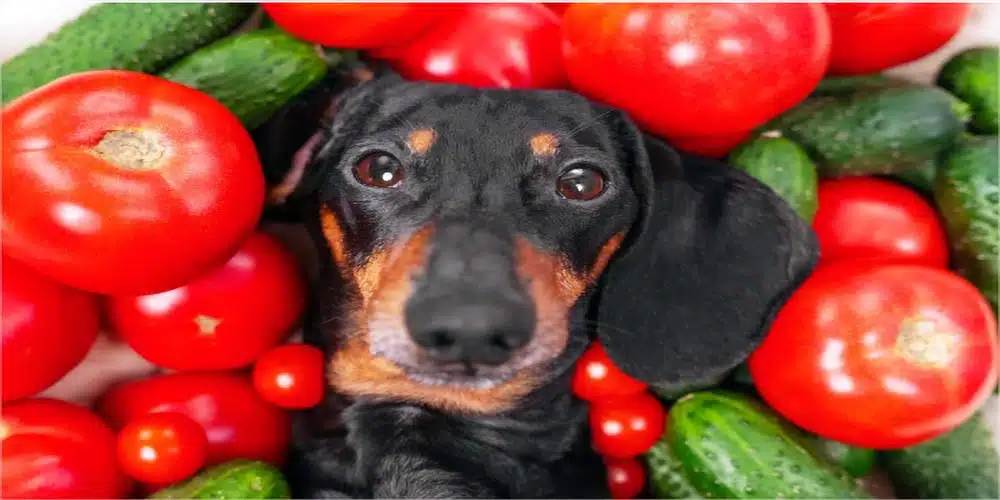

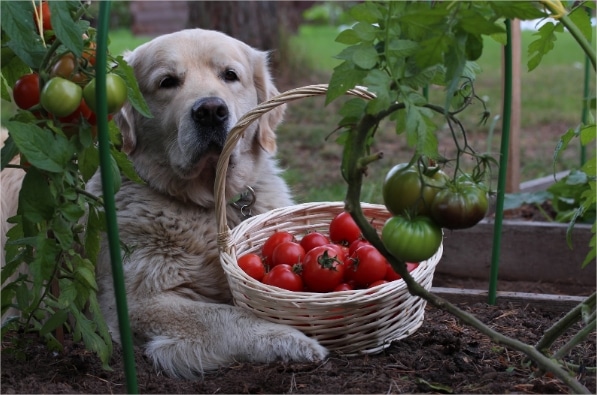
Most dogs will eat absolutely anything you put in front of them. From shrimp to bananas, they will eat it all, but some human foods can be toxic to dogs. Therefore, it is important to know what is safe to feed to dogs and which foods can be harmful.
So, what category do tomatoes fall under? Are tomatoes toxic to dogs? Well, in most cases the answer is no, but things aren’t necessarily as simple as you might think.
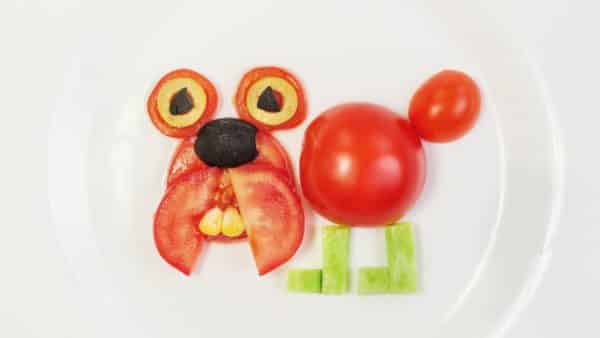
Tomatoes are part of the nightshade family of vegetables and contain poisonous compounds called tomatine and solanine, which serve as a natural defense against bacteria, fungi, and viruses. However, different parts of the tomato plant contain different amounts of these toxic substances.
The ripe tomato contains very small amounts of solanine and so is considered safe to feed to your dog, but the green parts of the plant such as the leaves, stem, and unripe fruit contain much more and so should be avoided. Younger plants will also have higher concentrations of these chemicals. For those of us that buy our vegetables from the supermarket, this shouldn’t be an issue, as we are rarely looking to come home with unripe tomatoes.
However, for those dog owners with a keen interest in home growing their produce, and perhaps making green tomato chutney and other such preserves, the tomato plant should be securely fenced off or their dog should be closely supervised when roaming the garden and put all the green tomatoes out of their way.
While tomatoes must be ripe it should also be noted that overripe fruit ferments as it breaks down which can cause intestinal problems, so never give your dog a tomato that is soft, blistered, and breaking down.
Tomatoes have high acidity and whilst not usually a problem this can give some dogs an upset stomach. Always give in moderation and be vigilant to any undesirable effects, especially when introducing tomatoes to your dog’s diet for the first time. Tomatoes are best treated as a snack, in slices, and should not be a replacement for your dog’s usual diet. Here’s some great information about feeding tomatoes to dogs.
It is also worth noting that in some rare cases, your dog may have an allergic reaction to the tomato, even if they have only eaten the ripe tomato fruit. Symptoms of an allergic reaction can range from diarrhea to itchy skin and even anaphylaxis. So, it would be best to avoid tomatoes, despite their health benefits, if this sounds like your dog.
If your dog is generally an allergic or sensitive dog, this allergy medicine for dogs contains a powerhouse of natural ingredients and may help provide relief from other seasonal and environmental allergens.
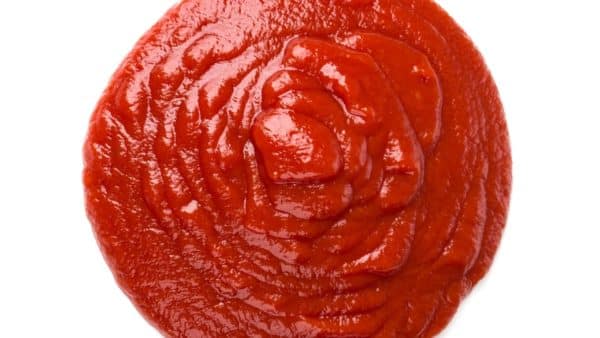
If you want to feed your dog tomato-derived products such as tomato ketchup or tomato sauce pay close attention to the other ingredients, as it is these rather than the tomatoes that might be the issue. In many cases, these products contain other harmful substances such as garlic, onions, and chives as well as other potentially dangerous chemicals and preservatives. For this reason, these products are not suitable for your dog. Homemade tomato sauces can be given as long as you avoid the aforementioned toxic ingredients and only use ripe tomatoes in the cooking process.
If your dog has ingested only small amounts of the tomato plant, they may show no symptoms at all, but keep an eye out for any mild signs such as Vomiting, Diarrhea, and lethargy.
Very large quantities of the green stem leaves or vines of the tomato plant must be eaten for your dog to show severe symptoms such as incoordination, excessive salivation, dilated pupils, an increased heart rate, or difficulty breathing, in addition to the symptoms mentioned above.
Should your dog show any of these symptoms of tomato poisoning, take them to the vet immediately.
Depending on the amount of toxin ingested by your dog and the symptoms exhibited, your veterinarian may recommend starting your dog on fluid therapy to replenish any electrolytes or fluids lost due to vomiting or diarrhea. If large quantities have been consumed, then gastric lavage might be performed – this involves pumping the contents of the stomach out through a tube to remove toxins before they can be absorbed by the body. Thankfully, in most cases the prognosis is good should treatment be initiated quickly.
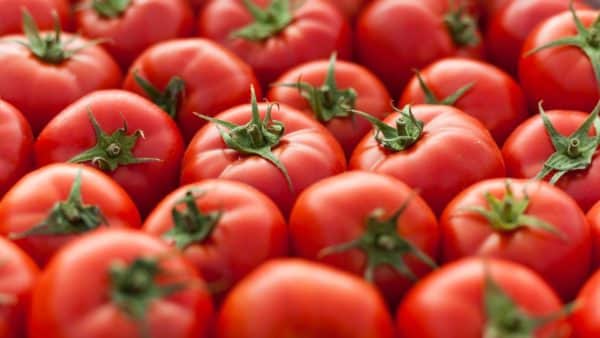
So now we know that the ripe tomato is safe to give to your dog, the question is, should you? And is there any benefit in doing so?
Yes! Tomatoes are very rich in nutrients, and many pet food manufacturers will add parts of the skin, pulp, and even seeds of uncooked tomatoes into their formula.
The fleshy parts of tomatoes are high in both soluble and insoluble fiber, which support normal bowel movements and healthy digestion.
Tomatoes are also packed full of phytochemicals such as lycopene which promotes strong and healthy bones, reduces the risk of heart disease and stroke, and may even aid in cancer prevention. In addition to these benefits, tomatoes are full of antioxidants and vitamins such as Vitamin A and Vitamin C. Vitamin A is very important in maintaining good vision, and Vitamin C aids immunity against infectious diseases. Tomatoes are also a good source of potassium which is important in regulating blood pressure as well as ensuring proper function of nerves and muscles.
It’s extremely important to make sure your dog is getting the micronutrients they need to be healthy. These supplements for dogs contain ALL the nutritional vitamins, minerals, antioxidants, and essential omega-3 fatty acids that will help your puppy or senior dog to stay healthy, happy, and in great tail-wagging condition!
If you suspect that your dog may have eaten a toxic substance, call the Pet Poison Helpline, Animal Poison Control, or your local veterinarian immediately.
Most of us train our dogs when they are puppies to jump up on furniture. We think it’s harmless (and easier than always lifting them), but for dogs, couches and beds are very high compared to the size of their bodies.
Every time they jump it compresses their back and applies enormous force to their joints.
It’s no wonder that an incredible 80% of dogs experience arthritis or joint pain by only 7 years old.
Luckily, there is a vet-recommended solution.
It’s the PawRamp by Alpha Paw. An adjustable ramp that allows dogs to safely get on and off couches and beds. PawRamp makes joining you in bed or on the couch effortless and fun.
As a bonus, you can use code SAVE35 to get $35 off the PawRamp today.

The medical, nutritional, or behavioral advice we provide is intended for informational and educational purposes only. Our editorial content is not a substitute for formal or personalized medical advice from a veterinary professional. Only board-certified veterinary specialists who have examined your pet should diagnose medical conditions, provide personalized treatment, or prescribe appropriate medication. For questions regarding your pet’s health, or if your pet is exhibiting signs of illness, injury, or distress, contact your veterinarian immediately. Never disregard professional medical advice or delay in seeking it because of something you have read on our site.